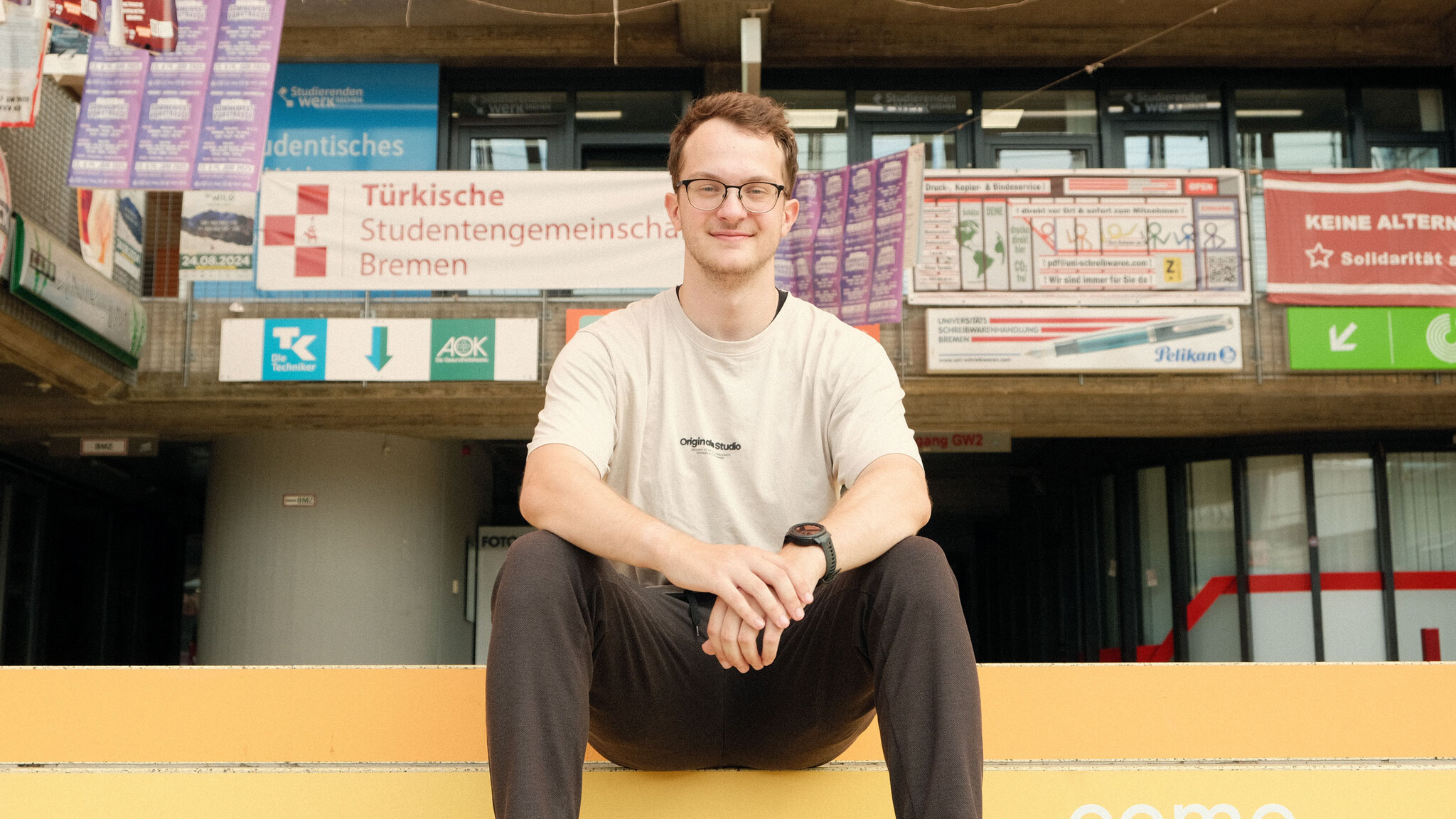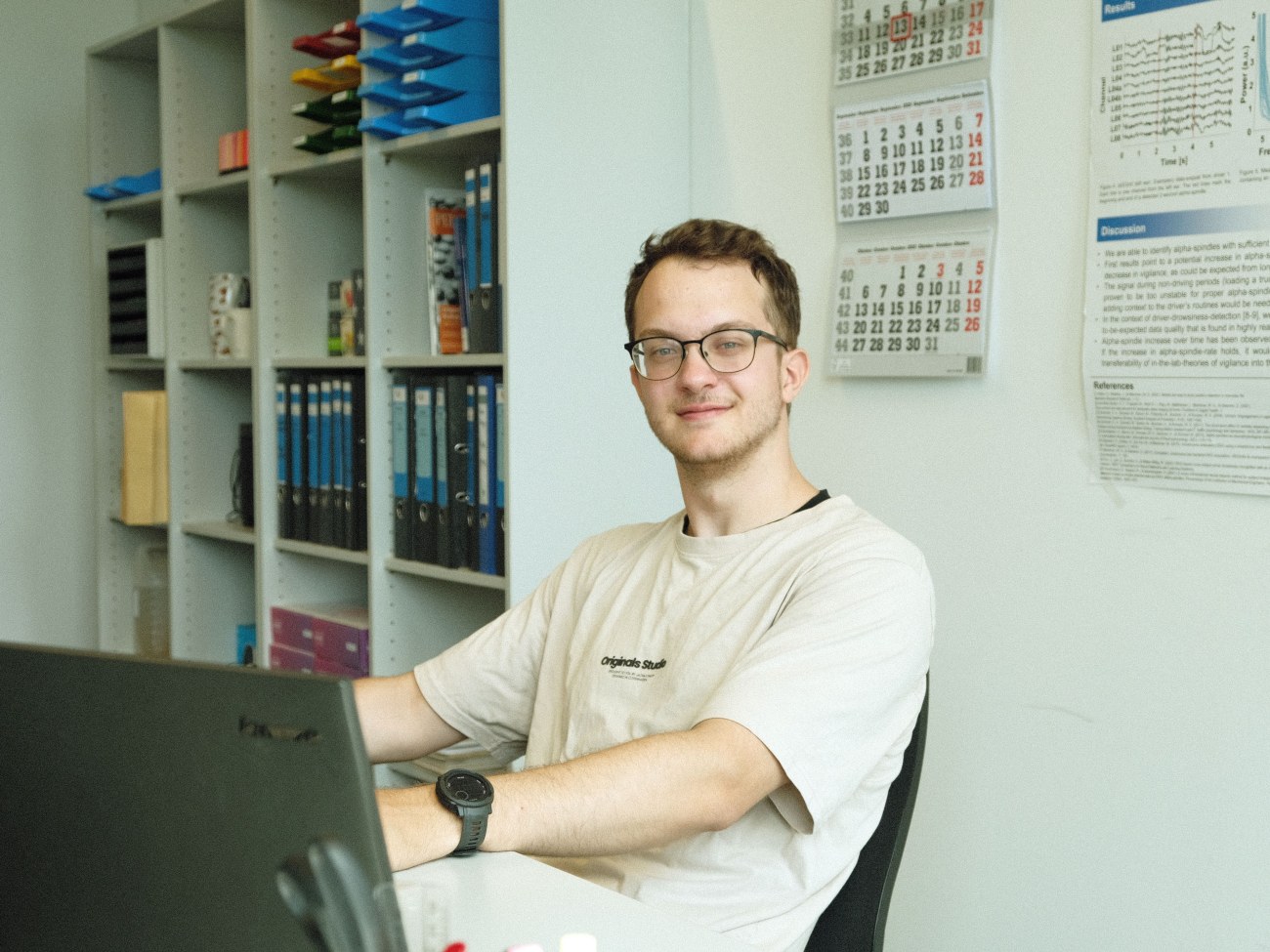
© Maria Bossauer / Universität Bremen
A Day in the Life of Student Florian
up2date. accompanied 25-year-old Florian on a typical day as student of business psychology at the University of Bremen.
After completing his vocational training as an IT specialist in Paderborn and earning his bachelor’s degree in business psychology from the Rheinische Hochschule in Cologne, the second semester master’s degree student deliberately chose to move north to study at the University of Bremen. For up2date., Cologne-born Florian outlines a typical Tuesday during the 2025 summer semester.
8:00 a.m. – A sporty start to the day!
For someone who doesn’t consider himself a morning person, the day starts early. Since Florian moved closer to the university, he gets up at around eight o’clock. To make good use of the time before his first class, he rides his bike or takes the tram to the gym. After an hour of working out, he comes back home, showers, and has a quick breakfast – usually a shake made from low-fat curd, nuts, and fruit.
10:15 a.m. – Lecture / Coaching training
At what is known as the academic quarter (most classes start 15 minutes or a quarter past the hour), the lecture on Occupational and Health Psychology begins in WiWi1 Building. On his way to class, Florian meets fellow students at traffic lights, the bike rack, and the stairwell. With around 30 students, the master’s program feels more like a large classroom, and the students interact with each other like family.
The lecture itself is interactive and hands-on, and covers topics such as workplace health promotion, work design, and work-life balance. “For our final project, we will develop our own intervention concept tailored to a specific occupational group and present it. Our group is focusing on nursing staff,” Florian explains. An intervention concept is a set of targeted measures designed to help address problems or disruptions in the work environment; in this case, the focus is on stress.
Since the seminar only takes place every two weeks, Florian regularly meets with his peer group during the time in between. The Business Psychology program allows students to undertake further training to become a systemic coach through CoachingZHub, which is integrated into the curriculum. In addition to monthly training days, learning and reflection takes place in small peer groups. “We have almost finished the first year of our training. For me, the group has become an important space for personal exchange and to develop new perspectives,” says Florian.
1:45 p.m. – Time for a snack
After three and a half hours of lectures, his head is full – and his stomach is empty. Most of the time, there isn’t quite enough time to visit the university campus dining hall (Mensa). “I always have a packet of cashews on me,” says Florian. Otherwise, he won’t get a proper meal later until at home. When he has the time, he enjoys the chili sin carne in the Mensa. “My secret tip is noodles with egg,” Florian reveals. “Unfortunately, they are not available very often.”

© Maria Bossauer / Universität Bremen
2:00 PM – A glimpse into research
Just a few flights of stairs away from the seminar room is Florian’s office. He works ten hours a week as a student assistant at the Chair of Human Resource Management and Business Psychology under Professor Vera Hagemann. He is involved in the MARSCRAFT project, which investigates how the design of job tasks, teamwork, and personal leisure time affect the performance, health, and well-being of astronauts on Mars missions. This October, a new global survey of data from various simulations is set to begin, and Florian assists with questionnaire development, planning, and evaluation, among other tasks.
He reports enthusiastically: “It doesn’t feel like I’m just completing chores. I get to contribute my own suggestions and I feel like a part of the team.” Florian says that gaining insight into a real research project is an added value for him alongside his usual student routine: “Many concepts from the lectures reappear in my project work. It’s exciting to personally connect with the lecturers from the program and get to know them in a new way. The idea of pursuing a Ph.D. has suddenly become more tangible for me through this job.”
6:00 p.m. – Evening submissions
After four hours of work, Florian heads home. However, his day is not over yet because Tuesday is the regular submission day for group assignments this semester. “The program generally involves a lot of group work and assignments throughout the semester, but there are no written exams at all,” Florian reports. Unlike many other students, therefore, the lecture-free period marks the start of a relaxed time for him, with just a few remaining assignments to submit.